An Interview
Tanya in TV-Land
P. Carl: Tanya, I want to start with a really simple question: what are you working on right now?
Tanya Saracho: I just got hired as a producer, or a writer, for How To Get Away with Murder—it’s really exciting for me because I have been a fan of that universe and Shonda Rhimes for a while. Theatre-wise, I’ve turned in some commissions and am working on Fade, a play about a TV writer and the studio custodian she sees every night who gives her plot ideas, who is the only Latino she ever sees. It will be produced in Denver. I also sold a play called Mala Hierba to HBO, which they are developing as a series. Right now we’re just in rewrites, notes back and forth, that process.
Carl: Mala Hierba had some productions, right?
Tanya: It got a really nice production at Second Stage and it’s my TV sample—usually you have a TV sample for your TV sample, but I have a play for mine. It’s gotten me all my jobs. Theatres are not doing it, but it’s gotten me TV work. Isn’t that strange?
Carl: Yeah that is! Where does the balance sit for you now between theatre and TV? Is one or the other taking precedence in your mind, or do you feel like you are able to balance both things?
Tanya: I’m not balancing them well at all. I started writing for TV for economic reasons. I don’t want to make a blanket statement, but a lot of playwrights go into television because of the money. I had a bunch of commissions and I was struggling to balance two or three productions that were going to go during my first year of TV. It was really hellish because I didn’t plan well—it all happened at the same time, so it was a mess.
I was a deviser for Teatro Luna before I became a playwright. It was a new thing, being in the regional theatre and being kind of a guest artist—coming in and leaving—because I came from the ensemble tradition where you build with who you are on stage with, and it was like a family thing. And then TV came—I wasn’t ready, mentally and spiritually. If I’m truthful, I’m not very happy with what I’m coming up with theatre-wise. I don’t know if TV tainted it, or if the meat in my brain can’t split, you know? I don’t know if I have enough brain for it. I started the TV thing so I could keep going with theatre. But I’m loving TV—it reaches so many people, even more than film; it’s like art for the masses—if you think it's art. And that is magic—you can really affect perception. Which is a big mission of mine, to affect the mainstream perception of women of color.
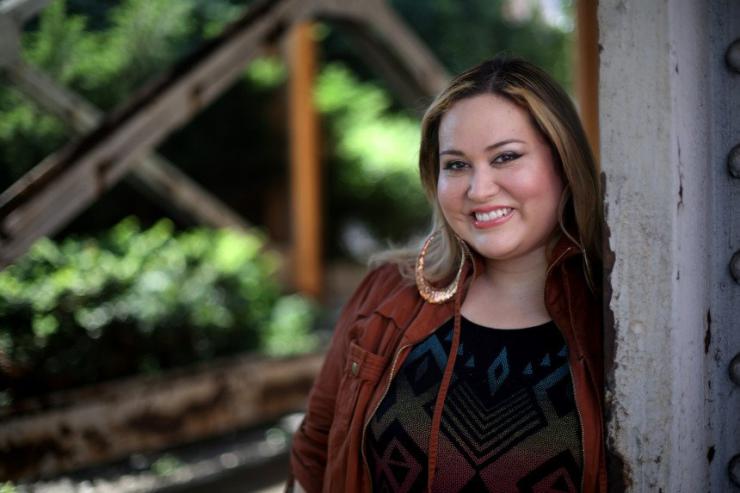
Carl: I, of course, think of you as writing these incredible, primarily Latina plays. In terms of character and story, has TV writing shifted your writing voice? Is there a shift, or do you feel like it’s expanding?
Tanya: I don’t know if it’s expanding, but there is a shift. I used to write really long scenes, and now it’s harder to because the format is shorter. And my theatre stuff is being affected—it’s really naturalistic now. I don’t know if it’s good or bad; only time will tell.
Carl: That’s really interesting because I think of your plays as magical in a way—almost dreamlike.
Tanya: Now it’s just people talking, and it happens in real time. It’s strange—what happened to my theatricality? I think I’m still making the shift, because I’m only in year three of this TV thing. It feels like a long time because I’ve had four gigs, and it did shift because I was on Looking for two years, and that’s mostly writing for gay boys. I’ve written seven all-Latina plays, all-female plays, so I didn’t know if I could write boys, but it turns out it’s fine! I was able to really get into the character Richie, who is the Mexican guy on Looking. Then this past season I acted in an episode that I wrote; I’m from Chicago—somewhere in there I’m still an actor. Some of the stuff I got to say in that episode, just subversive little shady things, catty girl things—this is the difference between theatre and TV. I played Richie’s cousin Ceci, who read him like a book and told it to him straight. She said “I would never date a fucking white guy, they think they own everything.” That one line became a meme. So many Latinos on Twitter were reaching out to me—it became this politicized thing. That was one of the few instances where I was like holy cow; you can really affect change here. I’m not trying to be anti-white male; I’m saying a character has a lot of power, depending on how well they’re liked. Look what Shonda has done—she’s created a whole universe of complicated, flawed women of color as leads. I’m learning that TV has some sort of a power if you get there. You know, but getting there…
I started the TV thing so I could keep going with theatre. But I’m loving TV—it reaches so many people, even more than film; it’s like art for the masses—if you think it's art. And that is magic—you can really affect perception.
Carl: It’s different writing for a TV show versus writing your own play. In one you have way more control over the direction of the story and the other is a more collaborative process, but what questions do you feel like you’re preoccupied with now as a writer? What are the big things you’re thinking about?
Tanya: Actually that hasn’t changed; my mission statement hasn’t changed, which is to make space for complicated Latina women. I’m working on my pilot, which has mostly women characters. And they are all flawed, and—I’m going to say ugly for lack of a better word—ugly because of the ugly things they do, and I feel like this is progress for Latino characters on TV. Because sometimes we are two-dimensional, and we don’t get to be fully flushed out humans on television. If I keep being able to create content, if I’m ever able to put something on the air, I know what palette I am going to use. It’s the same one I was using with Teatro Luna, which is exploring how complicated Latina identities are, which sounds a little more academic, but it’s just basically putting badass flawed Latina women—it used to be on the stage, but now on the screen. Hopefully I’ll keep doing that.
Carl: Do you think we are making progress, either in theatre or TV, or both, in being more inclusive in the theatre and making space for the kind of characters and stories that you want to tell?
Tanya: I don’t want to be shady towards theatre, but I feel like we’re stuck, so we’re talking a lot about the D word, you know, diversity? Your organization has been talking about it from the beginning, we’ve been talking about it for decades over here, but I feel like progress—it’s not being made, not for people of color, and not for women. I’m reading the season announcements and where are we? I know we’re writing; I know we are. I know we’re commissioned, we’re just not ending up in the season still, like before, like every decade before. So I don’t know what’s happening with theatre.
But I’m doing this commission with Two Rivers in Red Bank, New Jersey, and I was basically charged with reaching into the Latino community to craft a play. So I interviewed some high school students—half of them are undocumented. We had pizza, sat in a circle, and talked. At the end I asked, “OK what are your favorite TV shows?” Eighteen kids told me their favorite shows were Scandal, Jane the Virgin, How to Get Away with Murder, Orange is the New Black; there was one vote for Walking Dead and Empire. Okay what is the common denominator? Strong women of color. So these kids—they were all Mexican—are looking for themselves. They’re finding it in these shows, which give them more and more options than they might find in the theatre right now. Now, some of these shows are problematic because of the way Latinos are portrayed, but the kids are interested. They didn’t know I write for TV—they were just telling me their favorite shows. So I think that now, TV is really kind of trying. I don’t know if they are doing it right—I just know that there are more options—especially this past year, with Empire and How to Get Away with Murder.
Carl: It sounds to me that you’re finding more freedom to explore the things that interest you in the realm of TV—I can hear in your voice a kind of freedom to think about the possibilities about what a character can do and say.
Tanya: Access, too. I just went to see ToasT by Lemon Andersen—and there is a population that should go see that, right? But it’s still cost prohibitive for some people to go see. So, theatre is getting more and more exclusive. I just went to New York to see a couple of plays and I was like, really? Two hundred fifty dollars for a ticket? Who is that theatre for? The answer is evident—it’s for who can afford it. You can interpret what that community looks like. Even when theatre is about us [Latinos], we can’t afford to see it. But you can turn on ABC on Thursday night and see yourself for three hours on Grey’s Anatomy, Scandal, and How to Get Away with Murder, and it’s free. There’s something exciting happening. A lot of playwrights are riding that wave. Josh Allen is a writer on Empire. My How to Get Away with Murder writer’s room is three black women, two Asians, three white guys, and me. I don’t think five years ago the room was like that. Now I am getting a lot of meetings because I am Latina, and that’s fine. I don’t get the job because I am Latina, I get the meetings—let’s see some Latina writers, let’s see some Asian writers—but I feel like the reason you get the job is you have the goods, you know? Because you do have to deliver on scripts. I sound more excited about TV and I guess I am; I feel so guilty though.
She said ‘I would never date a fucking white guy, they think they own everything.’ That one line became a meme.
Carl: I appreciate the honesty, though, I think that’s great. As you’re navigating this, because as you were saying, you’ve been in TV only a few years, who are your mentors? Or who are you looking to as you’re winding your way through the complicated maze of any kind of writing career?
Tanya: On a day-to-day mentor level, Roberto Aguirre-Sacasa, who I worked with on Looking, has been the best model and mentor. He doesn’t just talk me through things like, “So what’s the contract look like?” or, “You need to ask your agent that.” I watch him; he’s a great model because he’s a commercial playwright. So he’s had Broadway shows, and he’s about to have another Broadway show, and he’s developing Broadway shows. He’s also the chief creative officer for Archie Comics. He writes movies and he writes for television. So he’s doing kind of like the dream everything. But his base is very much theatre; his first love will always be theatre. So I’m watching him prioritize and learning from that. And also he’s a good big brother who will sit with little micro things like an outline, or read a script, or talk to me like a dramaturg. So he’s been great, and he’s Latino, and he’s navigated this world. We also talk in Spanglish to each other, you know? We have our own secret code for switching language. He’s actually been like a godsend.
Carl: I always thought of you as a Chicago writer. And you just made the big move, giving up your apartment of eighteen years in Chicago to move to LA. Talk about how you knew it was time to make that change.
Tanya: I’ve been paying rent and not being in my Chicago apartment—that rent bought me peace of mind and a sense of belonging because I was a Chicago playwright. I just went to a meeting yesterday to get a new film agent. I told him about the move and he was like, “What? But I thought you were a Chicago playwright, that’s so much cooler.” It just kind of hurt because it feels like I can’t go back in the same way; I used to be like, “Oh I have a weekend, I’m going to go sit in my house.” Now I have to get a hotel room. My identity is so tied to Chicago, because Chicago watched me grow up in every sense. Teatro Luna, of course, but also the Goodman and Steppenwolf in different ways. I feel ungrateful leaving. I was just on a panel for something called “The Lake Effect,” and it was different people who found success in Chicago, but have since left. I said on the panel, “I hate that people come now, because now it’s a thing, and some people kind of use Chicago: ‘I want to spend a few years there doing Second City and then go to LA and get a TV show.’” I never came to Chicago that way, Chicago was the end game, you know? I just wanted to do theatre. I do think a lot of people do just want to come and make good work. It’s just that they realize that the system isn’t in place for us to make a living, especially as a playwright. In Chicago, commissions don’t cut it, and I’m not a good teacher. Yeah, there’s guilt because I don’t want to feel like I left my community, but I kind of did. I’ve had a low-grade anxiety attack brewing all week since I’ve moved here. It’s like a mourning period. I’ve been throwing up. I think it’s just mourning. I’m here now, I’m here—I’m really here.
Carl: It’s super exciting from my vantage point, having read your early plays and seeing your career be so alive. Whether you’re in Chicago or LA, I feel like the stories that you are trying to tell are so important right now. I’m just so glad to see you thriving with an outlet for your voice. Is there anything else you want to share?
Tanya: I’m just going to keep it on the Latino train, if that’s okay? There are enough Latino writers, what there’s not enough of are Latino producers, administrators, and artistic directors. I think that’s what we need on both sides of theatre and TV. Until we have those other positions populated really well, I think we are going to be in the same place.

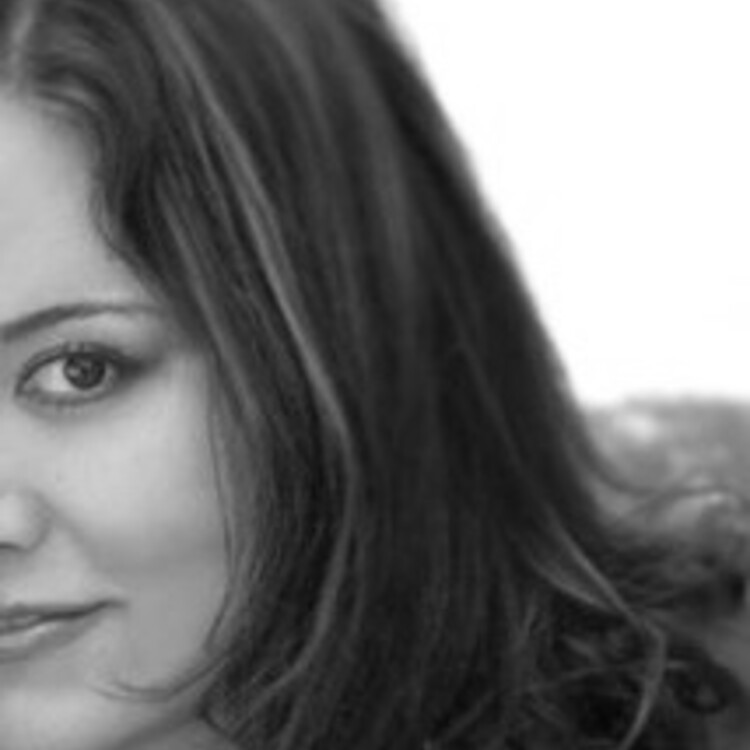

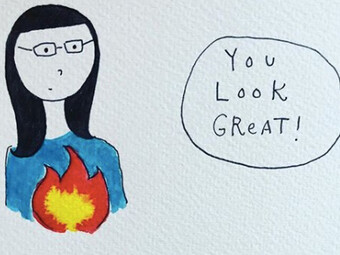


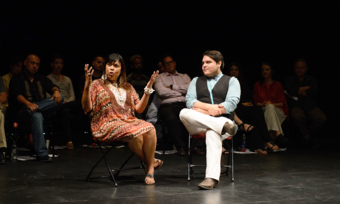


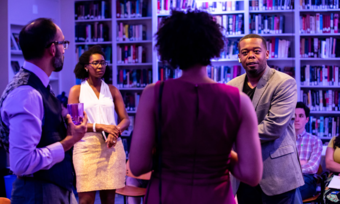


Comments
The article is just the start of the conversation—we want to know what you think about this subject, too! HowlRound is a space for knowledge-sharing, and we welcome spirited, thoughtful, and on-topic dialogue. Find our full comments policy here
What a great interview! thank you both for always keeping it real!
What a great interview Tanya and Polly. Tanya thanks for articulating everything so well and with such honesty and detail. I really love the specifics of the difference between the theater and TV industries. Maybe there is something theater can learn from TV?
Super interview, Tanya. You nailed so many things with your hammer, got to the truth of things so well. I congratulate you on your TV career. It's not easy balancing both worlds, but you have done it. Now I got more tv shows to watch and more plays to watch out for. Thanks!
A great interview- thanks, Polly, and thanks, as always Tanya, for your work and your candor.
What a fun interview! I love the scope of media referenced here--it's so important to think of dramaturgy in this fluid way, a craft to practice wherever narrative exists. One teeny shout out to a detail that may be under-the-radar: comic fans will instantly recognize the importance of the fact that Roberto Aguirre-Sacasa heads the creative team behind Archie Comics. For years now, that title has been quietly exploding with forward-thinking ideas, story lines, crossovers and characterizations that push social boundaries and challenge privilege. The Archie title--along with the Girl Scouts--has become one of the most consciously inclusive, progressive institutions in America. So it's a cool nod to Tanya that her mentor and inspiration is a driving force on that team.